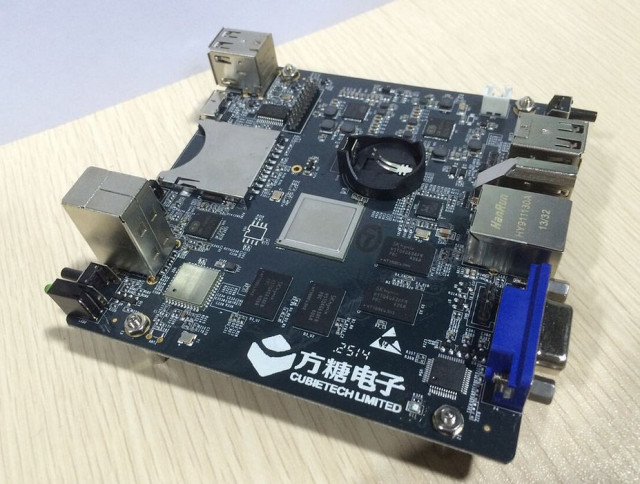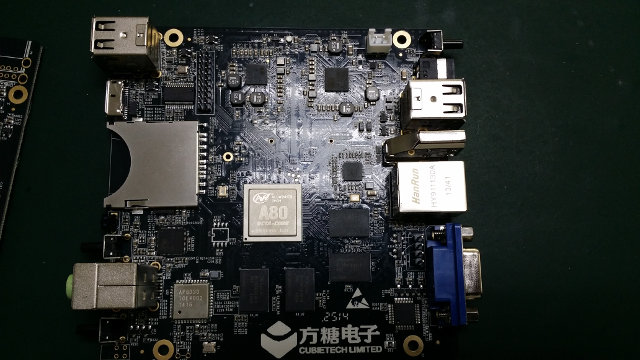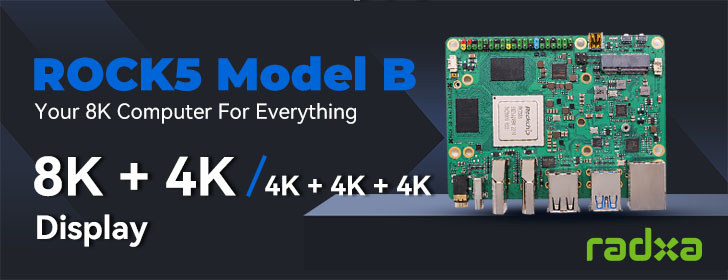Back in April, AllWinner announced partnerships with Linksprite and CubieTech for respectively PcDuino 8 and Cubieboard 8 development boards to feature AllWinner A80 octa core ARM Cortex 15/A7 big.little SoC. However, at the time all we got was some photo-shopped pictures of older versions of the boards with an A80 processor pasted by graphics designers. Some pictures of Cubieboard 8 have now surfaced, and they are clear enough so that we can start to get most of the specs.

Here are Cubieboard 8 specifications derived from the pictures (incomplete because we don’t have pictures of the back of the board):
- SoC – AllWinner A80 octa core big.LITTLE processor with 4 ARM Cortex A15 cores, 4 Cortex A7 cores, and Imagination PowerVR G6200 GPU
- System Memory – 2GB DDR3 (4x SKhynix H5TQ4G83AFR – 4Gbit RAM chips) – TBC in case they’ve added more RAM chips at the back, unlikely IMHO.
- Storage – TBD (At the back?) + SD Card slot
- Video Output – HDMI and VGA
- Audio I/O – HDMI, Line In, Line Out, and optical S/PDIF
- Connectivity – Gigabit Ethernet, Wi-Fi 802.11 b/g/n + Bluetooth 4.0 (AP6330 module)
- USB – 4x USB 2.0 host ports, 1x Micro-B USB 3.0 port
- Debugging – UART close to VGA port (TBC)
- Expansion Header – 20 pin header
- Misc – RTC battery slot, 2 LEDs, 3 push buttons
- Power – Round DC power jack (5V?)

That’s about all we know for now. AllWinner announced support for Android, Chrome OS (Chromium OS?), Ubuntu, Firefox OS, and Windows RT, so hopefully most will also be available with the board expect probably Windows RT, and possibly Chrome OS. Price and availability are unknown, but since AllWinner A80 MP is supposed to start this month, and in a previous interview, a $100 price target had been talked about, I’m really expecting the board to be available for around $100 by the end of this month.
Thanks to Jibril!

Jean-Luc started CNX Software in 2010 as a part-time endeavor, before quitting his job as a software engineering manager, and starting to write daily news, and reviews full time later in 2011.
Support CNX Software! Donate via cryptocurrencies, become a Patron on Patreon, or purchase goods on Amazon or Aliexpress




Nice! One question : will video hardware decoding on linux gonna work? because this is a BIG problem for LinuX on ARM…. although on android video hw decoding is working…..
Some ARM boards(RPi, Odroid-U3, Radxa?) run the XBMC with the GPU/VPU hw acceleration on Linux/Ubuntu.
Wonder why they did not just use standard PC motherboard form factor like Nano-ITX?
It would be much easier to find a case/chassi if they used a standard form factor.
http://en.wikipedia.org/wiki/Nano-ITX
http://en.wikipedia.org/wiki/Pico-ITX#mediaviewer/File:VIA_Mainboards_Form_Factor_Comparison.jpg
Hardware video decoding should work if they will just support OpenMAX Integration Layer (OMX IL) API on Linux like A80 is said to do on Android http://en.wikipedia.org/wiki/OpenMAX
The A80 will certainly be a high performance chip with those Cortex-A15 cores. But it doesn’t have SATA for mass storage and the PowerVR GPU could be a real problem with drivers.
IMHO, the Nvidia Jetson TK1 board is more promising. It is $200 though.
@Armer
Yeap, youre right abou RPI (i own one): her 😀 main problem is that the ARM11 CPU is outdated (in my opinion) and it has only 512MB of RAM.
Odroid U3 has hw video decoding BUT ONLY fo XBMC.
As far as i know, for Radxa there is no support .
BTW: for project Wandboard there is something functional (sort of) for hw decoding.
CubieBoard 8 has everything : firepower, RAM, graphics and it would be ashame if you would not be able to use it like a mini desktop.
What port is next to the SD card? Also looks like IR receiver on the other side?
@deets
That’s a USB 3.0 port. Not sure about the ir receiver.
Oh USB 3.0 micro my bad
2gb ram even 4gb if its doubled on the other side is still very limiting. no sata doesn’t help either, put 8 or 16gb ram and you would have a very nice virt host. or just put a couple of sodimm slots on and let the user pick what ram they want. using standard board sizes that can use existing cases would be very useful also.
If all you guys want is a mini PC there’s better things out there just look for Celeron fanless mini PC on aliexpress. The bare-bones version of it is below $150 with shipping.
For that money you get a dual core Ivy Bridge at 1.8 Ghz, x86 with quality Intel open source drivers, a nice fanless ALU case and SATA with space for a 2.5 SSD or HDD.
Of course if you really want ARM like I must admit I do this board is the way to go. The only problems with it is lack of SATA and PowerVR.
I just hope they don’t use a fan like Nvidia did with their Jetson and keep it passively cooked. This was one of the nice things with ARM, passive coolers.
At some point those ARMs will be pointless to use/buy when cheap x86 boards or nettops will be similarly priced yet allowing more RAM, offering SATA, good graphics support and more.
Looks like that some peoples want this board to start play around, even with fan or not,with hardware video acceleration, decoding and encoding, whatever.
I do think,that this board has some potential ,for a box mini pc,with their respective optimization, hardware and software, I think the main idea with this board is to workaround on Linux, android, because, no can’t do over wintel.
@Ian Tester
the nvidia is probably more interesting for GPGPU usage with it’s 192 shaders units (I would like to see some bench vs this new PowerVR 2 shader cluster arrays), and with it’s support of OpenGL 4.4 (vs OpenGL 3.2 for G2600), but :
* Nividia is only a quadcore A15 vs a quadcore A15 + quadcore A7 for the A80 (now managed together by linux kernel (android & GNU/Linux) with GTS mode, and very far lower power usage when only one quadcore A7 is needed for task. GCC 4.9 manage code tuning for big.Little that could be also be a plus.
* The nVidia card has only 1 USB (3.0) port, Cubieboard 8 has 4 USB 2.0 + 1 µUSB 3.0
For the drivers, AllWinner say it will support Linux, and libhybris should probably make the bridge if there is only Android driver. The Opensource driver reverse engineered USSE opcodes, around autumn 2013, don’t know what is the state of the drive now.